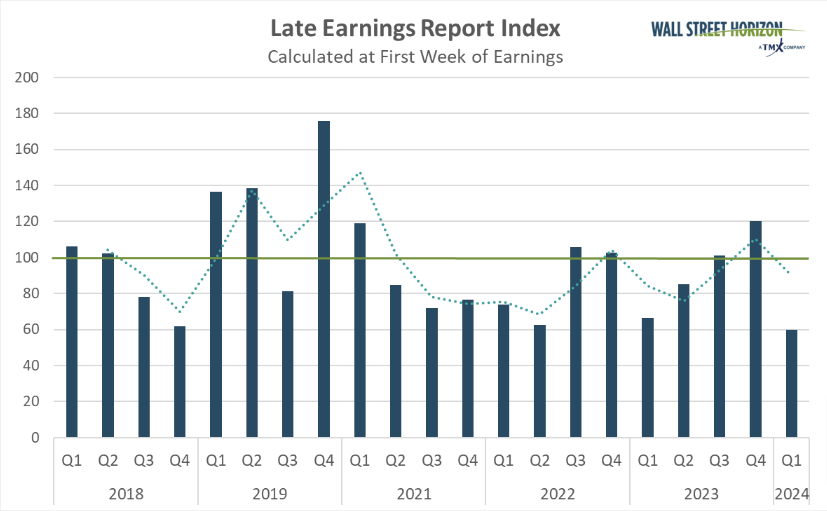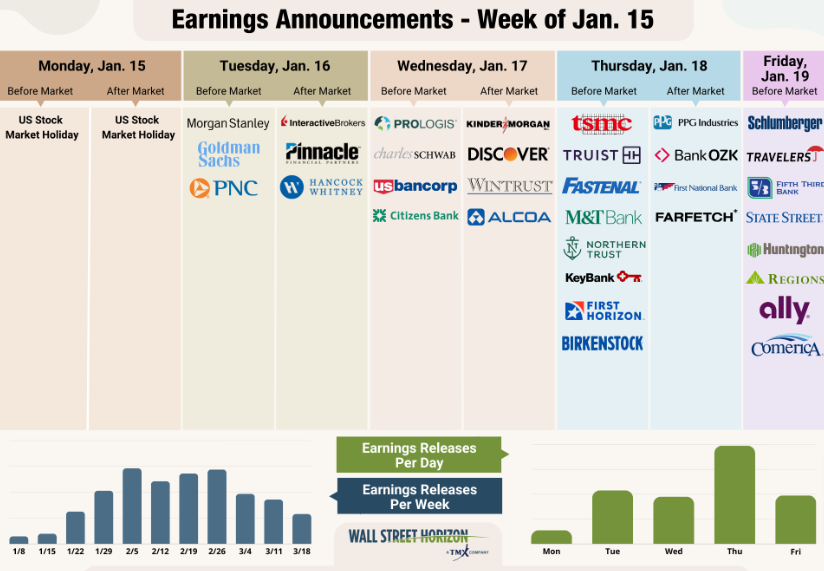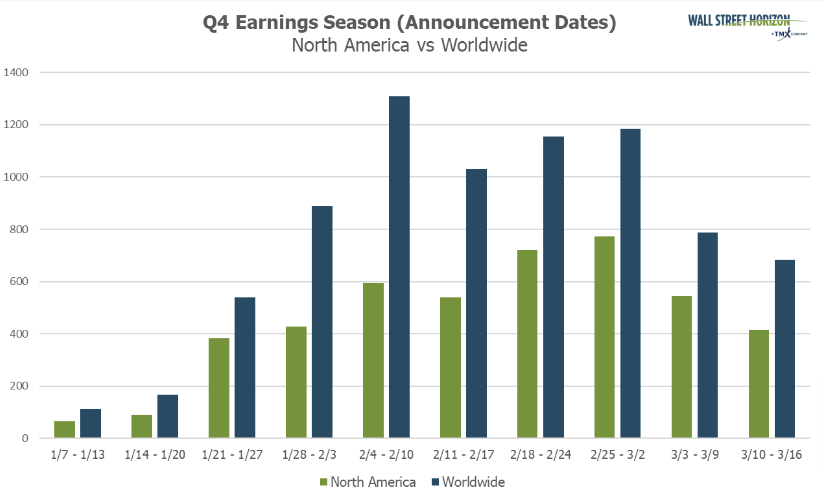Banks kick off earnings season on a sour note.
The LERI shows corporate uncertainty easing to its lowest level since 2015.
Up next: Morgan Stanley (MS), Goldman Sachs (GS), Taiwan Semiconductor Manufacturing (TSMC), Birkenstock (NYSE:BIRK).
Peak weeks for Q4 season run from January 29 - March 1.
More bad news for doves last week who are hoping for interest rate cuts sooner rather than later.
The Consumer Price Index (CPI) for December came in above expectations, showing sticky inflation is still in play and adding to the reasons that the US Federal Reserve (along with robust jobs numbers) may hold off on interest rate cuts in Q1.
Expectations for a Jan 31 rate reduction are dwindling, with the CME Group's (NASDAQ:CME) FedWatch tool now showing only a 4.7% chance that there will be a rate cut.[2]
Higher interest rates (as well as potentially lower interest rates later this year) were one headwind highlighted in many of the Q4 bank reports out last week.
Despite missing earnings expectations due to a $2.9B fee from regional bank rescues, JPMorgan Chase (NYSE:JPM) was still able to show revenue growth of 12% during the quarter, leading investors to take the stock higher after the report.
However, Jamie Dimon continued to strike a somewhat cautious tone on the US economy.
On the one hand he remarked that "The U.S. economy continues to be resilient, with consumers still spending, and markets currently expect a soft landing," but government deficit spending and restructuring of the global supply chain "may lead inflation to be stickier and rates to be higher than markets expect."
Sentiments from other reporting banks, Citigroup (C) and Bank of America (BAC), hit a similar tone, and results were also impacted by large fees tied to last year's regional banking crisis.
Citigroup saw earnings-per-share (EPS) fall 24% year-over-year (YoY) due to several large charges, and revenues declined 3% over the same period. Due to poor results and an embattled stock price, CEO Jane Fraser announced a 10% workforce reduction.
Bank of America reported revenue of $22.1B that missed expectations of $23.74B. The Charlotte, North Carolina based bank was also hit with a $2.1B fee tied to regional bank failures. Q4 EPS and revenues saw YoY declines of 18% and 10%, respectively.
While banks benefit from the bigger interest fees that higher rates bring, it's been at the expense of other areas such as loans and investment banking. Wells Fargo (WFC) noted this double-edged sword in their Q4 results.
While lower interest rates could mean net interest income falls by 7-9% YoY in 2024, higher interest rates have been problematic for deposits as consumers look for higher yielding instruments.
"As we look forward, our business performance remains sensitive to interest rates and the health of the U.S. economy, but we are confident that the actions we are taking will drive stronger returns over the cycle," said CEO Charlie Scharf.
According to FactSet, with this early round of disappointing results, blended S&P 500Ⓡ EPS growth has turned negative, now expected to come in at -0.1%.[7]
Corporate Uncertainty Eases to the Lowest Level on Record
Despite the tone from some banking executives last week, our proprietary gauge of corporate uncertainty just clocked its lowest reading on record.
Just as the Q4 earnings season gets underway, the most recent reading of the Late Earnings Report Index (LERI) shows that fewer companies are delaying earnings reports than advancing them.
The LERI tracks outlier earnings date changes among publicly traded companies with market capitalizations of $250M and higher.
The LERI has a baseline reading of 100, anything above that indicates companies are feeling uncertain about their current and short-term prospects. A LERI reading under 100 suggests companies feel they have a pretty good crystal ball for the near-term.
The official pre-peak season LERI reading for Q4 (data collected in Q1) stands at 60, the lowest reading in the metric's 9-year history.
As of January 12, there were 37 late outliers and 56 early outliers. This is in stark contrast to the LERI readings from the Q2 and Q3 earnings seasons which showed CEOs at their most uncertain since the COVID-19 pandemic.

Source: Wall Street Horizon
On Deck this Week
Financials continue to report this week, with big bank results wrapping up on Tuesday with Morgan Stanley (MS) and Goldman Sachs (GS).
We also will get a read on semiconductors when Taiwan Semiconductor Manufacturing reports on Thursday, January 18, and on how a recent IPO is faring when Birkenstock releases results on that same day.

Source: Wall Street Horizon
Q4 Earnings Wave
This season's peak weeks will fall between January 29 - March 1, with each week expected to see over 1,000 reports. Currently February 22 is predicted to be the most active day with 599 companies anticipated to report.
Thus far only 39% of companies have confirmed their earnings date (out of our universe of 10,000+ global names), so this is subject to change.
The remaining dates are estimated based on historical reporting data. Keep in mind the Q4 reporting season is always a bit more prolonged, typically stretching over four or five peak weeks rather than the usual three peak weeks seen in Q1 - Q3.

Source: Wall Street Horizon
